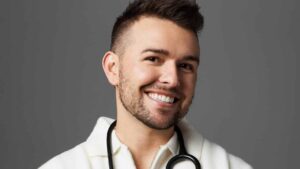Snapchat filters have become so popular, they might actually be causing mental illness.
A new article in the Journal of the American Medical Association reveals that a startling number of plastic surgery patients list “selfies” as a primary motivation behind getting a procedure. The doctors are calling it “Snapchat Dysmorphia,” when patients “seek out cosmetic surgery to look like filtered versions of themselves, with fuller lips, bigger eyes, or a thinner nose.”
The study says “this is an alarming trend because those filtered selfies often present an unattainable look and are blurring the line of reality and fantasy for these patients.” 26-year-old Crystal got cosmetic surgery to intentionally resemble her face with the “flower crown” filter on Snapchat.
She told the BBC: “I couldn’t help noticing the way the Snapchat filter changed my face. It enhanced my chin, contoured my cheekbones, and straightened out my nose, which was something I had always been self-conscious about.”
Now, it’s important to note that “Snapchat Dysmorphia” is just a colloquial term, and isn’t currently a diagnosable condition. Its close cousin, Body Dysmorphic Disorder, is a real mental disorder, and a whole bunch of studies over the last few years have revealed that social media has driven a huge increase in its visibility.
But not everyone thinks this growing trend is a bad thing.
San Francisco-based plastic surgeon Dr. David Mabrie says people used to only come in with photos of celebrities they wanted to resemble. He said “I prefer working off a real photo of someone, because they have a sense of what they might look like with fillers or Botox. They don’t have an unrealistic expectation that they’re going magically to transform into Kylie Jenner.”
ADVERTISEMENT
It appears that in 2018, looking like a preferred celebrity isn’t as important as the facial symmetry seen as a requirement for the perfect selfie. What psychologists worry about though, and this is backed up by scientific evidence, is that cosmetic surgery will actually make someone’s BDD worse, not better.
This is because patients frequently don’t like the way they look after surgery, which encourages them to get even more. But, Snapchat shouldn’t worry about this worsening their reputation quite yet.
Instagram still wears the filtered-flower crown for the social media platform worst for a young person’s mental health, being proven to increase anxiety, depression, sleeplessness and body image issues.
he doctor who coined the term “Snapchat Dysmorphia” however, suggests that cosmetic surgeons should do their best not to operate on patients with BDD. He says “Treating patients that [show] red flags is not only unethical, but also detrimental to the patient, as they need something that no needle or scalpel can ever provide.”
The emergence of selfies as one of the primary ways our faces appear in pictures may also be contributing to increased plastic surgery. That’s because selfies distort our face, acting almost like a funhouse mirror to make our noses look bigger than they are. And, the more people see their noses looking bigger, the more likely they are to get rhinoplasty.
Do you guys think Snapchat Dysmorphia is a real disease? Let us know in the comments or on Twitter at @WhatsTrending.
ADVERTISEMENT









